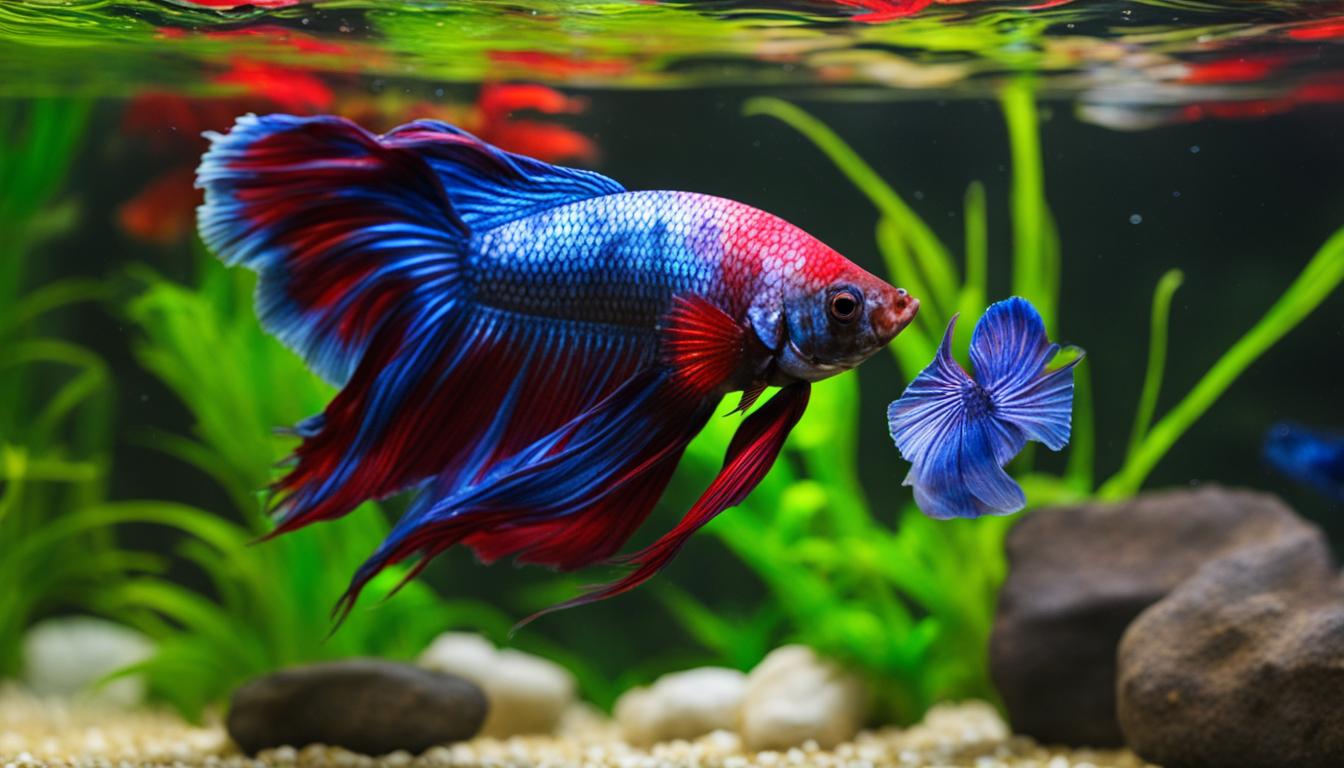Last Updated on 4 months by admin
As a betta fish owner, it’s essential to keep your fish healthy and active. Unfortunately, constipation is a common ailment that can affect betta fish of all ages. If left untreated, constipation can lead to serious health problems for your betta fish.
In this section, we will explore various remedies and treatments to help alleviate constipation in your betta fish. We will also discuss how to identify constipation symptoms and provide tips on preventing constipation in the first place.
Key Takeaways:
- Constipation is a common ailment that can affect betta fish.
- Effective remedies and treatments can alleviate constipation in your betta fish.
- Recognizing constipation symptoms is crucial for early intervention.
- Preventing constipation involves proper feeding habits and maintaining a clean fish tank.
- Consulting a veterinarian or fish expert may be necessary if symptoms persist or worsen.
Understanding Betta Fish Constipation
Constipation in betta fish can lead to various health issues, including bloated belly, loss of appetite, and even death if left untreated. While there are several remedies and treatments available, a better approach is to understand the causes and symptoms of constipation, and implement natural ways to relieve it.
Causes of Betta Fish Constipation
Constipation in betta fish can be caused by several reasons, such as overfeeding, consuming inappropriate food, and poor water quality. Betta fish have a small stomach and can only eat a small amount of food at a time. Overfeeding or feeding food that is difficult to digest can lead to constipation. Poor water quality can also affect digestion and lead to constipation.
Symptoms of Betta Fish Constipation
The most common symptom of betta fish constipation is a bloated belly. However, other symptoms include loss of appetite, lethargy, and difficulty swimming. If you notice any of these symptoms, it’s essential to take action immediately.
Natural Remedies to Relieve Constipation in Betta Fish
There are several natural ways to relieve constipation in betta fish, including:
- Fast your betta fish for one or two days to allow its digestive system to rest and reset.
- Feed high-fiber foods, such as brine shrimp, daphnia, and peas, to aid digestion.
- Ensure your betta fish tank is clean and has appropriate filtration to maintain good water quality.
- Adjust feeding habits and ensure you’re providing a balanced diet that is easy to digest.
Implementing these natural remedies can help alleviate constipation and promote overall digestive health in your betta fish.
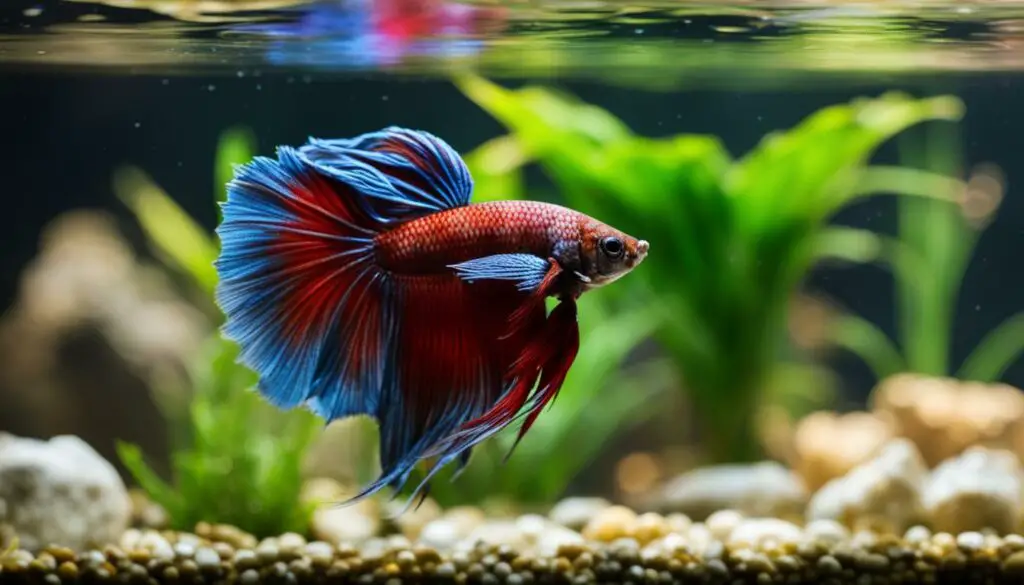
Tip: Avoid overfeeding and provide a suitable diet that meets the nutritional requirements of your betta fish. It’s also recommended to feed small amounts of food at regular intervals throughout the day rather than one larger meal.
Preventing Betta Fish Constipation
Preventing betta fish constipation is crucial to ensure that your fish remains healthy and active. By adopting the following techniques, you can help your betta fish maintain proper digestion and avoid constipation altogether:
Dietary Habits
Feeding your betta fish with a suitable diet and ensuring that they receive proper nutrients is essential to prevent constipation. Here are some dietary habits you can adopt:
- Feed your betta fish small portions of food two to three times a day
- Avoid overfeeding your betta fish as excess food can lead to constipation
- Incorporate High-fiber foods in your betta fish diet such as peas, lettuce, and spinach
Your betta fish will also require a balanced diet that includes quality protein, vitamins, and minerals to prevent constipation and maintain overall health.
Maintaining a Clean Fish Tank
Proper tank cleanliness is essential to prevent constipation in your betta fish. A dirty tank can lead to the growth of harmful bacteria, which in turn can lead to digestive problems in your fish. Here are some tips:
- Change around 20-30% of the tank water every week to maintain water quality
- Ensure that your betta fish tank is well aerated and has a filter to break down waste quickly
- Clean the fish tank regularly to remove any debris or uneaten food
What to Feed a Constipated Betta Fish
If your betta fish has become constipated, you may need to adjust their diet to help relieve the symptoms. Here are some options:
- Fast your betta fish for a day or two to give their digestive system a break
- Feed your betta fish with high-fiber foods such as peas (boiled or steamed), lettuce or spinach
- Offer your betta fish live or frozen small meals of bloodworms or brine shrimp, which are natural laxatives
Conclusion
Preventing betta fish constipation is all about adopting good dietary habits, maintaining a clean tank, and taking prompt action to relieve symptoms. By keeping your betta fish healthy and happy, you can avoid constipation and ensure a long and fulfilling life for your aquatic pet.
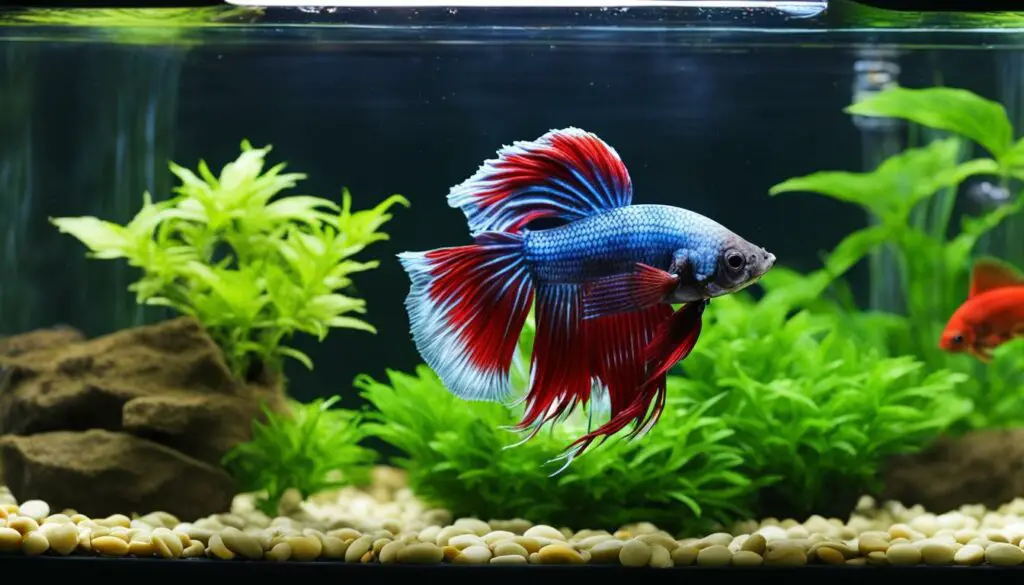
Identifying Constipation Symptoms
Recognizing the signs of constipation in your betta fish is essential for providing timely relief. Common symptoms of constipation include:
- Decreased or lack of appetite
- Bloated belly
- Difficulty swimming or floating
- Small, discolored feces or no feces at all
If you notice any of these symptoms, it’s important to take action to provide relief for your constipated betta fish.
It’s also important to note that some of these symptoms may also indicate other health issues, such as swim bladder disease or dropsy. Therefore, it’s best to observe your betta fish’s behavior and seek professional assistance if symptoms persist or worsen.

Tip: Regularly monitoring your betta fish’s feeding habits, water conditions, and overall behavior can help identify constipation symptoms early on and prevent them from worsening.
Dietary Adjustments for Constipated Betta Fish
One of the most effective ways to relieve constipation in betta fish is through dietary adjustments. By implementing natural remedies, you can promote healthy digestion and alleviate constipation without the use of medication.
Here are some dietary adjustments you can make to help relieve constipation in your betta fish:
- Incorporate high-fiber foods such as peas or lettuce into your betta fish’s diet. Be sure to blanch or cook the vegetables beforehand to avoid digestive issues.
- Feed your betta fish small portions throughout the day instead of one large meal. This can help prevent overeating and aid in digestion.
- Consider fasting your betta fish for one or two days to give their digestive system a break. This can be especially helpful if your betta fish has been overfed or has a bloated belly.
- Avoid feeding your betta fish constipating foods such as dried or frozen foods, as these can be difficult to digest.
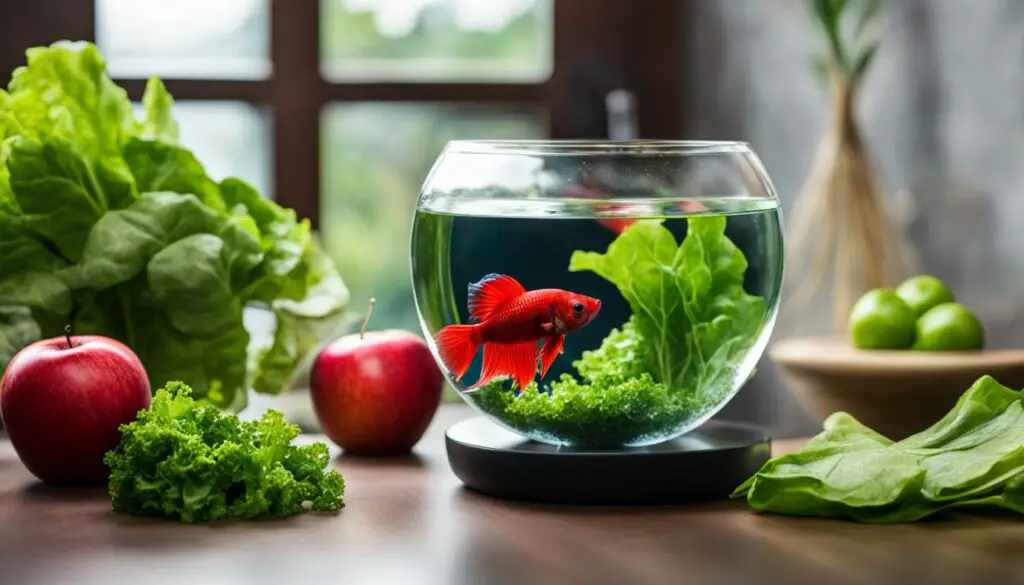
If you’re unsure about what to feed your betta fish, consult your local pet store or veterinarian for recommendations. Remember, a balanced diet is key to preventing constipation in your betta fish.
Gentle Exercise Techniques for Betta Fish
Encouraging your betta fish to stay active is an effective way to promote healthy digestion and prevent constipation. Here are some simple yet gentle exercise techniques you can use:
- Flaring: When betta fish flare their fins, they are exercising their muscles and promoting blood flow. You can encourage your betta fish to flare by presenting them with a mirror or another betta fish. However, be sure to monitor their behavior and remove the mirror if they become overly aggressive or stressed.
- Swimming exercises: Gently guiding your betta fish through hoops or around a designated course can help them stay active and promote bowel movements. Just be sure to use a soft and lightweight object to guide them, such as a plastic ring or a soft-bristled brush.
- Resting spots: Providing your betta fish with a resting spot near the surface of the water, like a leaf or a floating decoration, can encourage them to swim upwards and promote digestion.
Remember to never force your betta fish to exercise, as this can cause stress and harm. Gentle and natural techniques are the best way to help your constipated betta fish stay active and promote healthy digestion.
Additionally, keeping your betta fish in a spacious and enriched environment can also promote natural activity and prevent constipation.
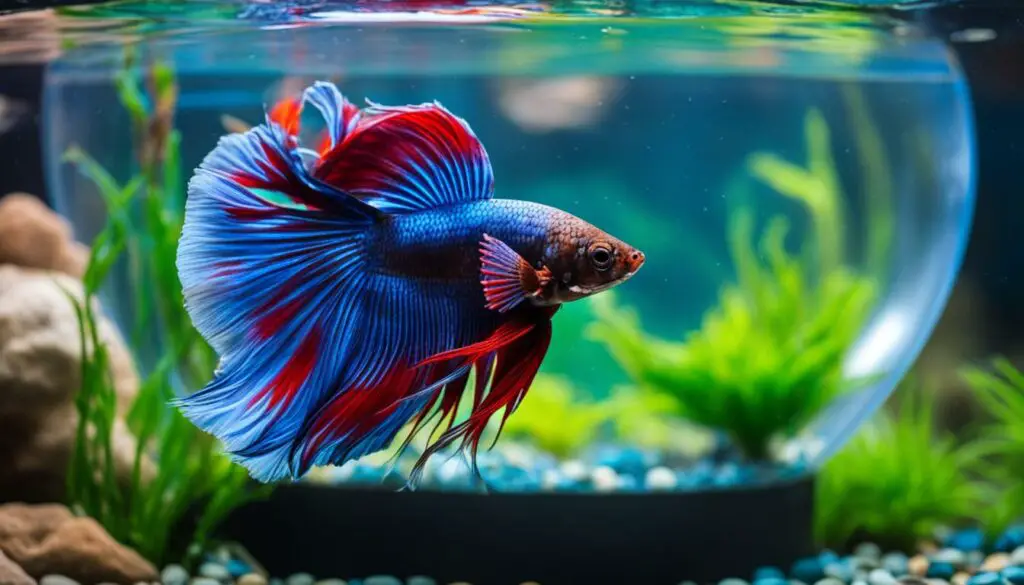
Water Quality and Constipation
Poor water quality can be a leading cause of betta fish constipation. High levels of toxins and pollutants can disrupt the natural digestive process of your fish, leading to bloating and bowel irregularities. Therefore, maintaining a clean and healthy water environment is crucial to prevent constipation in betta fish.
To ensure the best water quality for your betta fish, consider investing in a proper filtration system, and perform regular water changes to remove any accumulated debris and waste. Aim to change 25-30% of the water at least once a week. Additionally, monitor the pH level and water temperature to ensure they are within the recommended range for betta fish.
Along with maintaining optimal water conditions, there are several home remedies and treatments you can consider to alleviate constipation in your betta fish. Naturally, this depends on the severity of your fish’s constipation and the specific needs of your fish. Consider incorporating the following methods to relieve betta fish constipation:
- Epsom Salt Bath: Dissolve one teaspoon of Epsom salt per gallon of water and soak your betta fish in the solution for 10-15 minutes. This promotes bowel movement and helps relieve constipation.
- Pea Diet: Feed your betta fish boiled peas with the outer skin removed, which can help break down any blockages in the digestive system.
- Betta Fish Food: Switch to a high-fiber, pellet-based diet, specifically designed for betta fish with digestive issues.
However, if your betta fish’s constipation persists, it may be necessary to seek professional assistance from a veterinarian or fish expert. They can provide a more advanced diagnosis and offer appropriate treatment options to cure your betta fish’s constipation.
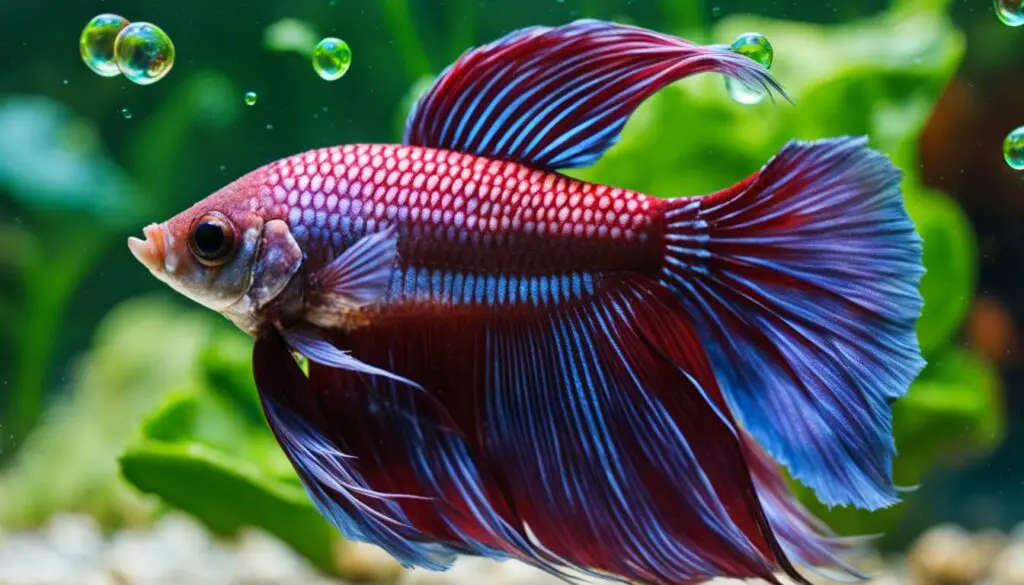
Seeking Professional Assistance
If your betta fish’s constipation symptoms persist or worsen despite implementing remedies and treatments, it may be necessary to seek professional assistance. A veterinarian or fish expert can provide a more advanced diagnosis and treatment options for your constipated betta fish.
It’s important to choose a reputable and experienced professional who specializes in fish care. They can perform a thorough examination of your betta fish and provide a customized treatment plan based on their specific needs.
If your betta fish requires medication, it’s essential to follow the prescribed dosage and schedule to ensure its safety and effectiveness. Avoid using over-the-counter medications or remedies without consulting a professional, as they may be harmful or ineffective.
Remember to prioritize your betta fish’s health and well-being by seeking professional assistance when necessary. With the right treatment, your constipated betta fish can make a full recovery and return to its active and vibrant self.
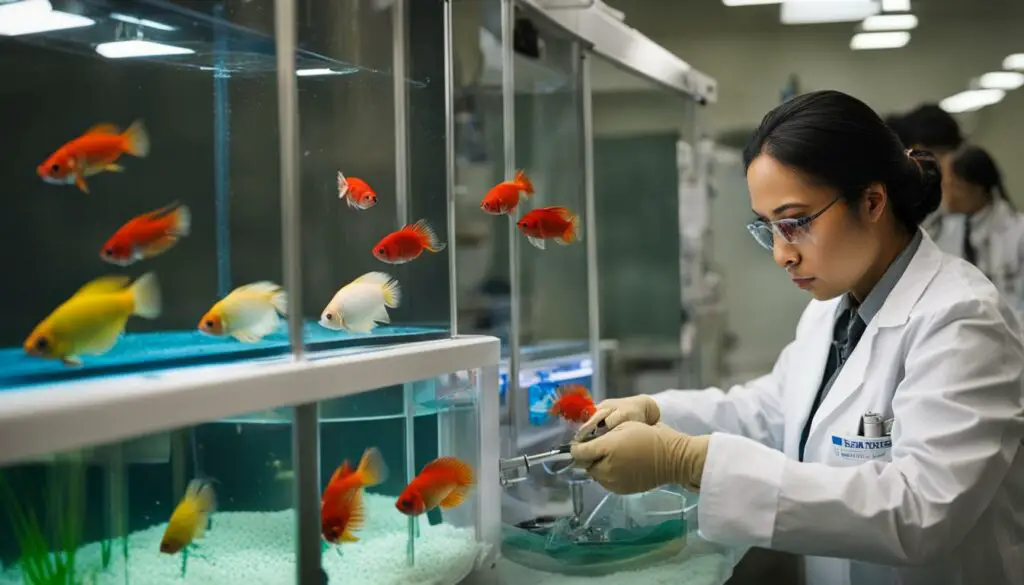
Keyword: betta fish constipation treatment
Conclusion
By following the tips and techniques discussed in this article, you can effectively unconstipate your betta fish and prevent future episodes of constipation. Remember to prioritize clean water conditions, a balanced diet, and regular monitoring of your betta fish’s digestive health.
If your betta fish’s constipation symptoms persist or worsen despite your efforts, it may be necessary to seek professional assistance from a veterinarian or fish expert. Don’t hesitate to reach out for a more advanced diagnosis and treatment options.
Overall, taking care of your betta fish’s digestive health is essential for their overall well-being. With a little bit of effort and attention, you can keep your betta fish healthy, active, and happy for years to come.
FAQ
How do I know if my betta fish is constipated?
Look for signs such as loss of appetite, bloated belly, and decreased activity levels.
What causes constipation in betta fish?
Constipation in betta fish can be caused by overfeeding, improper diet, or poor water quality.
How can I prevent betta fish constipation?
Maintain a balanced diet, avoid overfeeding, and ensure clean water conditions in the fish tank.
What can I feed my constipated betta fish?
Offer small portions of high-fiber foods like daphnia, brine shrimp, or cooked peas to help relieve constipation.
How long does it take to unconstipate a betta fish?
With proper remedies and treatments, it may take a few days to a week for the betta fish’s constipation to improve.
Can exercise help relieve betta fish constipation?
Gentle exercise techniques, such as using a mirror to encourage flaring or placing obstacles in the tank, can help promote bowel movements.
How often should I clean my betta fish tank to prevent constipation?
Regularly clean the tank and change a portion of the water every week to maintain optimal water quality.
Should I consult a professional if my betta fish’s constipation persists?
If the symptoms persist or worsen, it’s advisable to seek professional assistance from a veterinarian or fish expert.
Can I use Epsom salt to relieve betta fish constipation?
Epsom salt baths can be used as a last resort under the guidance of a professional, as it can be stressful for the fish if not administered correctly.

